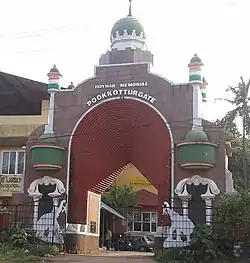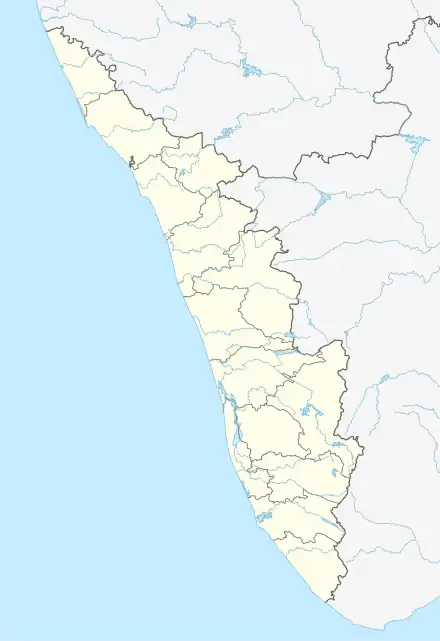| Battle of Pookkottur | |||||||
|---|---|---|---|---|---|---|---|
| Part of Malabar rebellion | |||||||
 Masjid built for the memorial of the Battle | |||||||
| |||||||
| Belligerents | |||||||
| Mappila rebels |
| ||||||
| Commanders and leaders | |||||||
| Vadakke veettil Muhammmad † |
Cuthbert Buxton Lancaster Captain P McEnroy † | ||||||
 Location within Kerala  Battle of Pookkottur (India) | |||||||
The Battle of Pookkottur was one of the battles that the Mappilas of Malabar fought against the British army during anti-colonial struggles in 1921 in Malabar province of Northern Kerala. The battle took place on 26 August 1921 at Pookkottur in present-day Malappuram district under the leadership of Vadakkuveettil Mohammed, the Secretary of the Khilafat Committee in the Malabar region, who led the force of Variyankunnath Kunjahammad Haji while Cuthbert Buxton Lancaster and Captain P. McEnroy were leading the British force. The Battle of Pookkottur plays an important role in Malabar rebellion.[1][2]
Background
The Khilafat movement was popular in Pookkottur, Malappuram, Kerala. After the outbreak of the Malabar rebellion in 1921, the British army and police were forced to retreat from these areas. A group of British officials stuck in Malabar, including Malappuram district Magistrate Austin, asked the district administration to bring forces for their rescue. The forces left Kozhikkode to Pookkottur in 22 lorries and 25 cycles under Captain McEnroy and Superintendent of Police Malappuram, CB Lancaster. This information reached Kunjahammed Haji, a rebel leader, and he discussed the matter with Pookkottur leaders including Vadakkuvettil Mammad and Kunji Thangal, and decided to attack the British army at Pookkottur. Rebels prepared themselves for war under the leadership of Mammad.[2][1]
The Battle
On the morning of August 21, 1921, rebels reached Pookkottur, where British forces came in with 22 lorries and 25 cycles. The rebels' plan was to let their lorries enter until they reached Pilakkal and then ambush them from all sides. But Parancheri Kunjarammutty who was not present in the last meeting of the rebels did not know of this plan, and Kunjarammutty who was concealed behind a heap of soil opened fire at the first lorry while there were only two or three lorries already present in the field. Hearing the gunshots, the army reversed the lorries and threw smoke bombs on all sides. Due to the smoke, the rebels were unable to aim their guns properly. Despite this, they managed to inflict numerous casualties. Under cover of smoke, the military set their machine guns to fire. When the smoke dissipated, about ten soldiers walked on the road by foot towards Pilakkal under the guise of a surrender, which lured the rebels to come forward to capture them. The soldiers retreated and opened fire on the rebels with machine guns, killing numerous rebels who came forward. Kunjarammutty, who opened fire at first with other rebels, charged the army with swords once their own guns ran out of ammunition. Vadakkuveetil Mammad, the commander of the rebels also were killed. The war lasted for almost 3 hours and as per the official documents on the incident, 400 on the rebel side and 4 soldiers from the British side were listed as casualties, but eyewitness A. Muhammed in his book "Swathandrasmaranakal" (Malayalam), said that he had seen two lorries going to Westhill, Kozhikode carrying many dead bodies including injured soldiers.
After the battle, the army was on the way to Malappuram with Superintendent of Police Cuthbert Buxton Lancaster and four soldiers in a lorry at the front. At Kummalippadi, a Mappila rebel, Mankara Thodiyil Kunjahmmed climbed on a tree and threw a grenade into the lorry in which police and soldiers were travelling. Lancaster and several soldiers were killed instantly.
References
- ↑ Menon MPS, Malabar Samaram MP Narayana Menonum Sahapravarthakarum Pd15, IPH Calicut 1994, ISBN 81-8271-100-2
- ↑ Nair.C.Gopalan, The Moplah Rebellion 1921 (Calicut 1923)
- ↑ Hitchcock RHA, A History of the Malabar Rebellion 1921, Usha Publications New Delhi, 1983
- ↑ Geetha P, 1921 le Chila Charithravarthamanagal, Current Books Thrissur 2105 May, ISBN 978-81-226-1265-3 (Malayalam)
- ↑ Namboodirippad, Mozhikunnath Brahmadhathan, Khilafat Smaranakal, Calicut, 1965 (Malayalam)